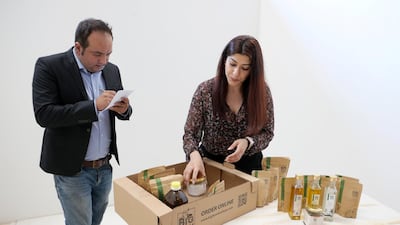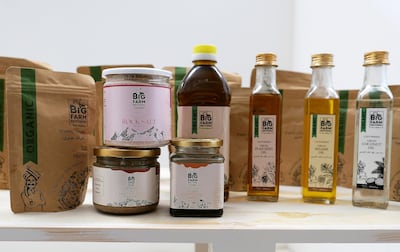Vishal Mahajan and Navneet Kaur, two Dubai-based marketers with farming roots in India, want to eliminate the perception that organic food products sold in the UAE are expensive.
The strategy at their start-up, Big Farm Brothers, is to pay farmers the highest price for their organic produce, which is then sold to consumers at the lowest price.
The company, which is in Dubai Investment Park, is keeping its margins low – between 7 per cent and 8 per cent – and plans to increase profitability through greater sales volumes.
Their online business model and direct purchases from certified organic farmers have resulted in a significant reduction in costs.
Big Farm Brothers has managed to keep its selling prices low through a strategy of smart buying, lower set-up costs for brick-and-mortar retail shops and by paying established retail chains for shelf space to exhibit its merchandise.
“Consumers are aware that organic is better than conventionally produced agricultural products. However, such products are expensive,” says Mr Mahajan.
“This is what we are trying to change."
There is a clear change in the mindset of consumers, with Covid-19 helping to hasten this shift, while demand for healthier ingredients and eating options is on the rise, he says.
However, there are not enough organic farmers to source products from. Mr Mahajan says by buying at a higher rate, Big Farm Brothers intends to pay the right price to support farmers who have chosen to stay true to the natural way of cultivating and harvesting crops.
“It has to be enough of an incentive for them to remain in the business and continue organic farming in the long run,” he says.
Mr Mahajan, an advertising and event management professional, has been in the UAE for about two decades while Ms Kaur, a University of Wollongong finance graduate, was born and raised in the Emirates. She quit her auditing job with PwC to start her own events management company in 2012.
Since 2014, the two have been behind events such as public food festival TruckersUAE, Street Food Market, the Reggae Beach Festival and brands such as My5meals, a healthy meal plan kitchen.
Mr Mahajan says the idea of reconnecting with his farming roots and setting up a company providing a win-win model for farmers and consumers has been close to his heart for years.
The “urge to get into [the] organic foods business got stronger" each year he took his family to India on holiday and tasted naturally produced farm products in states such as Himachal and Punjab, the breadbasket of India.
The partners began to carry out research in 2018 and started to work with international farm boards that promote and validate sustainable farming.
The idea at that stage was to approach investors for the capital to lift the project off the ground. However, the funding never materialised.
“We went around to ask for money”, but there was always a “barrage of negative questions and doubts” about one more start-up looking to bring cheaper organic food to the UAE, says Ms Kaur.
“We realised that anyone who was willing to put in the funds would have a devil’s advocate attitude,” she says.
Ms Kaur says the partners at "that point knew that they had to put in their own money into the venture".
Big Farm Brothers was set up in September 2018 after the founders sunk Dh500,000 ($136,240) into research and development and business set-up costs.
They poured in another Dh250,000 when operations began in December and the company began to run product trials.
In February, Big Farm Brothers formally unveiled its toxin-free range of natural products in the UAE. Their box of 54 products includes grains, pulses, sugar, honey, spices and oils and costs Dh529.
Half of the company's sales were made before the first shipment arrived. The founders say their prices are about 20 per cent to 30 per cent lower than some of the other brands being sold in retail shops.
Ms Kaur says the plan is to increase the product range to 150 products within a year and reinvest revenue to allow the business to grow.
They plan to go back to venture capitalists once they establish a solid business case to help them to expand to Saudi Arabia and Kuwait, and then to other GCC countries and beyond.
“We need to prove ourselves first and that is when we will speak to investors,” she says.
Big Farm Brothers may also consider the franchise model for its expansion as it has already been approached by a company in Bahrain seeking to enter into a partnership.
“We have told the Bahraini partner to take baby steps,” says Mr Mahajan.
He says if the company decides to pursue the option of franchising, it will “look to get into the Bahrain market by September or October this year”.
Big Farm Brothers is currently sourcing organic produce that can be traced back to the farmers in India.
“The traceability of the product is a factor that is very crucial to consumers,” says Mr Mahajan.
“Our products come with a QR code that will show customers the point of origin of the crop they are holding in their hands.”
The founders will diversify their sourcing base and procure goods from other Asian nations such as Pakistan and the Philippines. They also plan to source produce from Africa once Covid-19 travel restrictions are eased.
Big Farm Brother also has two other product verticals. Its Big Garden Souq sells indoor plants sourced directly from growers in Holland, as well as terracotta pots and garden furniture made by local artisans.
In March, the start-up launched ComBin, an organic recycling and natural composting solution for households in the UAE.
Both businesses recorded double-digit growth during the soft launch and the founders expect to see a sharp rise in demand when their marketing campaign begins.
Q&A with Vishal Mahajan, co-founder of Big Farm Brothers
What skills have you learnt during your journey as an entrepreneur?
I have learnt how a brand is to be managed and developed in each market. Also, the nitty-gritty of how to procure a product from the right sources and at the right prices. Most importantly, I have learnt how to bring different parties on a single platform with a common interest and shared goals.
What were some of the challenges you faced during your entrepreneurial journey?
When you are starting something new, the journey obviously is never easy. However, coming from a farming background in India, I knew about the agriculture sector, how farming is conducted and the processes that one needs to be aware of before starting a business related to agriculture.
However, having knowledge does not save you from headwinds and challenges along the way. Any venture you launch is time consuming and the most painful of challenges is not being able to spend quality time with your family. The time and effort required to start something new, for which you hold passion for, can also sometimes lead to emotional breakdowns.
Financial stress is another headache altogether, but I am thankful to my family and business partner for continuous psychological and financial support. We are on this journey together.
What other start-up do you wish you had launched?
I always wanted to be part of an innovative recycling project. I wish I had done something related to that. But having said that, we have taken a small step towards that objective by introducing ComBin in the market. We are working closely with communities and guiding them how to make their own compost to make their soil nutrient-rich, which can they used to grow their own fruits and vegetables on their own balconies or in their gardens.
If you could do it all differently what would you change?
It is too early to answer this question. However, we have realised that the link between the product and its customers is missing and we are trying to bridge that gap. The traceability of a product is important. Our products come with a QR code to show customers the point of origin.
Where do you see the business in five years?
We hope to take our business global but before that we want to ensure that we set up a strong base in the UAE and other GCC markets. We are already in talks to franchise our brand with like-minded people who understand the need to spread the awareness about organic produce.
What is your mantra for success?
Procure as high as possible and sell as low as possible. Less profit but better volume of business – a model that benefits us, farmers and consumers.



